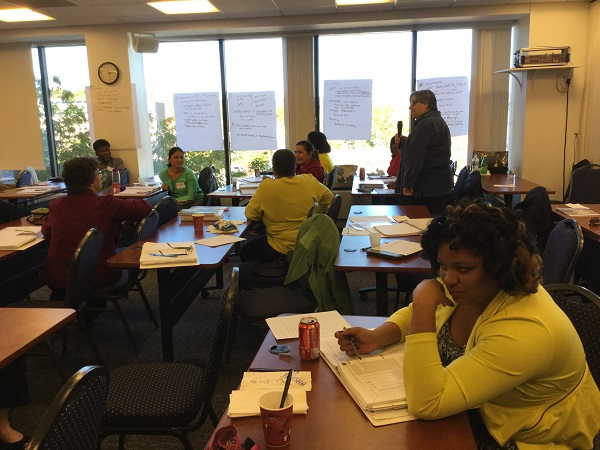Transforming Behavioral Health
For nearly two decades, The Connecticut Women's Consortium has been at the forefront of transforming the way behavioral health is practiced.
 |
| Participants learn the best practices for trauma-informed care. Photo credit by The Connecticut Women's Consortium. |
At a local mental health clinic, all the patients were required to pass through a metal detector. Yet the clinicians and staff entered through a different set of doors with no security. After a series of training sessions provided by The Connecticut Women's Consortium, clinic administrators came to realize this sent the wrong message to patients. Because trust is at the foundation of a successful patient-clinician relationship, the different set of rules potentially undermined the successful delivery of care.
"It was assuming the clients were more dangerous than the employees," says Connecticut Women's Consortium Executive Director Colette Anderson. "We shouldn't assume one group more dangerous than the other. We need to think about how we collaborate."
For nearly two decades, the Hamden-based nonprofit has been at the forefront of transforming the way behavioral healthcare is delivered. At the center of this work is training front-line social workers, case managers, and counselors to be more responsive to women and patients with histories of trauma. Clients include drug rehabilitation clinics, state-run, and nonprofit mental health clinics, schools, and other organizations that see patients who have experienced trauma.
The organization was honored for this work last week by the Connecticut Women's Hall of Fame. It received the Founding President's Award, which recognizes the outstanding work of a Connecticut nonprofit that educates and empowers women.
"It is quite an honor for us," says Anderson.
Training behavioral health agencies are needed, according to Anderson, when clinicians focus on the psychological diagnosis of a patient but neglect to uncover a personal history of sexual assault, violence, or other trauma that could have led to the behavioral health issue in the first place. The goal is to create a culture shift in an agency so that everyone who works there is aware of how even the smallest interactions can affect a patient with a history of trauma.
One best practice, according to Anderson, is as simple as asking whether the patient prefers to be seen by a male or female clinician. The patient may be less trusting of someone from one gender or the other, especially when discussing sensitive topics like sexual assault, drug testing, or cavity searches during incarceration.
"We're giving agencies a system of values so they change how they work and relate to the people they work with," says Anderson.
The Connecticut Women's Consortium receives the largest share of its funding from a contract to train workers at the Department of Mental Health and Addiction Services. It also provides trauma and gender-informed training to other state and local agencies, schools, and nonprofits. A recent grant from The Community Fund for Women and Girls supported Girls Circle, a gender-specific support program for adolescent girls in local schools.
The Community Foundation for Greater New Haven recently provided the organization a grant to train prison reentry service providers.
To learn more about The Connecticut Women's Consortium and support its mission, visit its profile on giveGreater.org®.
Did you know?
The Connecticut Women's Consortium trains more than 6,000 people per year, according to Anderson.
This story is part of the Inspiration Monday story series produced by The Community Foundation for Greater New Haven.
